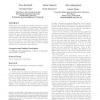Free Online Productivity Tools
i2Speak
i2Symbol
i2OCR
iTex2Img
iWeb2Print
iWeb2Shot
i2Type
iPdf2Split
iPdf2Merge
i2Bopomofo
i2Arabic
i2Style
i2Image
i2PDF
iLatex2Rtf
Sci2ools
110
click to vote
GECCO
2007
Springer
2007
Springer
Do additional objectives make a problem harder?
In this paper, we examine how adding objectives to a given optimization problem affects the computation effort required to generate the set of Pareto-optimal solutions. Experimental studies show that additional objectives may change the runtime behavior of an algorithm drastically. Often it is assumed that more objectives make a problem harder as the number of different trade-offs may increase with the problem dimension. We show that additional objectives, however, may be both beneficial and obstructive depending on the chosen objective. Our results are obtained by rigorous runtime analyses that show the different effects of adding objectives to a well-known plateau-function. Categories and Subject Descriptors F.2 [Theory of Computation]: Analysis of Algorithms and Problem Complexity General Terms Theory, Algorithms, Performance Keywords Multi-objective optimization, Running time analysis
Related Content
| Added | 07 Jun 2010 |
| Updated | 07 Jun 2010 |
| Type | Conference |
| Year | 2007 |
| Where | GECCO |
| Authors | Dimo Brockhoff, Tobias Friedrich, Nils Hebbinghaus, Christian Klein, Frank Neumann, Eckart Zitzler |
Comments (0)

